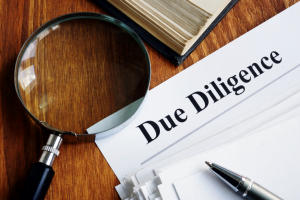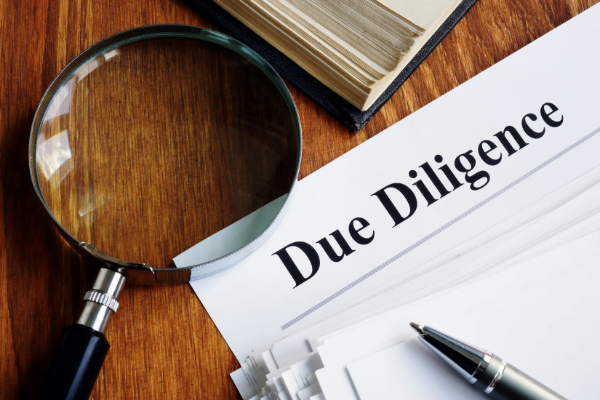Why should I conduct a due diligence check before purchasing a business?
If you are considering purchasing a business, it is essential that you complete a due diligence check.
Due diligence is the process of conducting a thorough review of business structure, operations and background to help you to make an informed decision on whether the business is suitable for you. For more information on how to conduct a due diligence check, please see our article How Should I Conduct a Due Diligence Check Before Purchasing a Business?.

When should a due diligence check be conducted?
Once you and the seller have reached an in principal agreement on a sale, due diligence should be done. It should never be done after you sign the sale of business contract. This will enable you to ensure that the terms you have agreed to are suitable and appropriate. Furthermore, it will enable you to negotiate or clarify any points of uncertainties with the seller before binding formalities are completed.
What are the most important aspects to check for?
What are you purchasing?
You can purchase a business in one of two ways:
- Purchasing the shares in the company that owns the business: When you purchase the shares in a company that owns a business, you will gain ownership of the whole company. In this way, you will acquire assets as well as debts (liabilities) that the company currently possesses. If you are going to purchase the shares of a business, as part of your due diligence, it is important to thoroughly check what liabilities you will be acquiring as well. This may inform your decision as to whether you wish to purchase the business. We do not recommend this approach as there may be liabilities of the company which could have a serious impact on the company.
- The business: When you purchase just the business you are buying the assets of the business including goodwill, you may be able to choose which assets you wish to buy. When you buy the assets of a business, you can exclude liabilities from your purchase, unlike when you purchase shares, in which you automatically acquire these.
You should also consider the legal structure you need to adopt when you purchase the business. Businesses typically can be purchased:
- In a private company;
- In your own name individual; or
- In a trust.
Current state of the business
It is vital that as part of your due diligence you also conduct searches on the background and present state of the business. In particular, you will want to consider:
- Is the business facing any lawsuit?
- Does the business have any liabilities, such as unpaid loans or uncompleted contracts?
- What is the current financial state of the business, and is it commercially viable?
Terms of the sale of business agreement
The sale of business agreement is the contract that contains all of the terms and conditions relating to the sale.
It is important that both the buyer and seller understand all of these, given that it is a legally binding agreement. If you feel that there are some aspects of the contract that are lacking clarity, or you believe a term or condition should be included, negotiate this with the seller before the contract is signed. Anything that is not in the contract after it is signed will not be covered. We have outlined some aspects in the sale of business agreement that you should consider.
Key commercial terms
The key terms of the sale of business contract will include:
- What assets are included as part of the sale (including such as equipment, databases and intellectual property);
- The cost of purchasing the business;
- What debts/liabilities you will acquire as part of the sale (if any);
- The date on which you will become the owner of the business; and
- Will the seller provide training?
Conditions you need to fulfil before the sale
In some instances, the sale of business contract may outline that there are certain conditions that you must fulfil before a set date to enable you to purchase the business. For example, you may need to prove that you have adequate finances to purchase the business, that you have the correct licences, if the business is run from leased premises that the landlord consents to the lease being assigned to you.
Non-compete clauses
A non-compete clause is something that you must consider including in your sale of business contract, to protect you as a buyer. Non-compete clauses are essentially promises that prevent the seller of the business from engaging in anti-competitive behaviour after the sale, which could affect your business prospects. For example, it could prevent the seller from:
- Opening a competing business in the same location;
- Producing the same kinds of products;
- Taking employees from the business being sold; or
- Taking clients from the business being sold.
Employees and contractors
Retaining existing employees and contractors may be useful for you as a buyer, given that they will have knowledge of how the business operates. Giving you greater freedom to invest time in understanding the business, as opposed to starting from scratch. The transition may therefore be smoother, and disruptions will be limited. You should check with the seller if the sale of business contract allows you to take over the current employees and contractors (of course the employees and contractors will have a say on whether they want to work for you) . If this is the case, you should confirm:
- Whether there are any non-compete clauses;
- What are the duties/obligations of the employees/contractors under their contracts;
- The length of their contracts; and
- Accrued employee entitlements.
Suppliers and Customers
In addition to employees and contractors, if there are suppliers and customers who have played an important role in the business, you should ensure that they will want to continue dealing with you. This will also help you to ensure continuity is maintained in the transition, and you can benefit from existing business relationships that have made the business successful.
As part of this, you will need to conduct inquiries into who are the key suppliers. Furthermore, if the business that you are purchasing involves customers who are on contracts, you should be aware of what your rights and obligations are with regard to these.
Leases
If the business you are purchasing involves you operating from physical premises (such as a café, office or factory) you should check:
- How long the lease operates for;
- Costs and increases in rent; and
- ‘Make-good’ clauses: This is a clause that obliges the tenant to return the premises to its original state before they vacate it.
Intellectual property (IP)
As part of your due diligence, you should also check what intellectual property you will be acquiring. This is often one of the most valuable assets of a business, and in some cases, such as when you are purchasing an online business, IP is the most valuable asset. IP can include a number of things, such as trademarks, logos and designs, databases, and publications that are important for brand recognition and loyalty.
You can check that the business owns any trademarks it uses, so that you can continue to use this after your purchase. Check the Australian Trademark Register to confirm who owns trademarks in a business (including words and images).
Key Takeaways
- Before you commit to purchasing a business, ensure you complete your due diligence to confirm that it is suitable for your needs, and you are aware of your rights and responsibilities.
- Understand what you will acquire as part of your purchase, through careful review of the sale of business contract.
- If you feel there is a lack of clarity in any part of the contract, or you think something should be included in the contract (such as an asset), negotiate this with the seller before you sign the contract.
If you have any questions about purchasing a business, you can contactLord Commercial Lawyers business lawyers on (03) 9600 0162 or email us at info@lordlaw.com.au or fill out the form on this page.




















